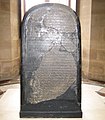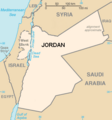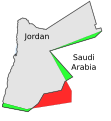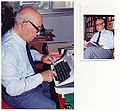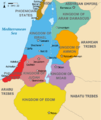Portal:Jordan
The Jordan Portal  Jordan, officially the Hashemite Kingdom of Jordan, is a country in the Southern Levant region of West Asia. Jordan is bordered by Syria to the north, Iraq to the east, Saudi Arabia to the south, and the occupied Palestinian territory of the West Bank and Israel to the west. The Jordan River, flowing into the Dead Sea, is located along the country's western border. Jordan has a small coastline along the Red Sea in its southwest, separated by the Gulf of Aqaba from Egypt. Amman is Jordan's capital and largest city, as well as the most populous city in the Levant. Modern-day Jordan has been inhabited by humans since the Paleolithic period. Three kingdoms emerged in Transjordan at the end of the Bronze Age: Ammon, Moab and Edom. In the third century BC, the Arab Nabataeans established their Kingdom centered in Petra. Later rulers of the Transjordan region include the Assyrian, Babylonian, Roman, Byzantine, Rashidun, Umayyad, Abbasid, and the Ottoman empires. After the Great Arab Revolt against the Ottomans in 1916 during World War I, the Greater Syria region was partitioned by Britain and France. The Emirate of Transjordan was established in 1921 by the Hashemite, then Emir, Abdullah I, and the emirate became a British protectorate. In 1946, Jordan gained independence and became officially known as the Hashemite Kingdom of Jordan. The country captured and annexed the West Bank during the 1948 Arab–Israeli War until it was occupied by Israel in 1967. Jordan renounced its claim to the territory to the Palestinians in 1988, and signed a peace treaty with Israel in 1994. Jordan is a semi-arid country, covering an area of 89,342 km2 (34,495 sq mi), with a population of 11.5 million, making it the eleventh-most populous Arab country. The dominant majority, or around 95% of the country's population, is Sunni Muslim, with the rest being mostly Arab Christian. Jordan was mostly unscathed by the violence that swept the region following the Arab Spring in 2010. From as early as 1948, Jordan has accepted refugees from multiple neighbouring countries in conflict. An estimated 2.1 million Palestinian (most of whom hold Jordanian citizenship) and 1.4 million Syrian refugees were present in Jordan in 2015. The kingdom is also a refuge for thousands of Christian Iraqis fleeing persecution. While Jordan continues to accept refugees, the large Syrian influx during the 2010s has placed substantial strain on national resources and infrastructure. The sovereign state is a constitutional monarchy, but the king holds wide executive and legislative powers. Jordan is a founding member of the Arab League and the Organisation of Islamic Co-operation. The country has a high Human Development Index, ranking 102nd, and is considered a lower middle income economy. The Jordanian economy, one of the smallest economies in the region, is attractive to foreign investors based upon a skilled workforce. The country is a major tourist destination, also attracting medical tourism due to its well developed health sector. Nonetheless, a lack of natural resources, large flow of refugees, and regional turmoil have hampered economic growth. (Full article...) Selected article -The Disi Water Conveyance Project is a water supply project in Jordan. It is designed to pump 100,000,000 cubic metres (2.2×1010 imp gal) of water per year from the Disi aquifer, which lies beneath the desert in southern Jordan and northwestern Saudi Arabia. The water is piped to the capital, Amman, and other cities to meet increased demand. Construction began in 2009 and was mostly completed in July 2013 when the project was inaugurated by King Abdullah of Jordan. Its total cost was US$1.1 billion. An independent study revealed the water to be radioactive and potentially dangerous to drink, initially surrounding the project with controversy. Jordan's Ministry of Water and Irrigation has stated that the radioactivity is not a problem because the water is to be diluted with an equal amount of water from other sources, although it remains disputed if this would be enough to bring the water up to standards. The Ministry said the independent study was inaccurate, as it did not test water from any of the wells that will be used in the project. The President of the Jordanian Geologists Association Bahjat Al Adwan stated that the radiation is present in the water in the form of radon, and thus dissipates harmlessly when the water is exposed to air on the surface. (Full article...)Selected biography -Abdullah II bin Al-Hussein (Arabic: عبدالله الثاني بن الحسين, romanized: ʿAbd Allāh aṯ-ṯānī ibn al-Ḥusayn; born 30 January 1962) is King of Jordan, having ascended the throne on 7 February 1999. He is a member of the Hashemite dynasty, who have been the reigning royal family of Jordan since 1921, and is considered a 41st-generation direct descendant of the Islamic prophet Muhammad. Abdullah was born in Amman as the first child of King Hussein and his wife, Princess Muna. As the king's eldest son, Abdullah was heir apparent until Hussein transferred the title to Abdullah's uncle Prince Hassan in 1965. Abdullah began his schooling in Amman, continuing his education abroad. He began his military career in 1980 as a training officer in the Jordanian Armed Forces, later assuming command of the country's Special Forces in 1994, eventually becoming a major general in 1998. In 1993, Abdullah married Rania Al-Yassin, with whom he has four children: Crown Prince Hussein, Princess Iman, Princess Salma and Prince Hashem. A few weeks before his death in 1999, King Hussein named Abdullah his heir, and Abdullah succeeded his father. (Full article...)WikiProjectFor editor resources and to collaborate with other editors on improving Wikipedia's Jordan-related articles, see WikiProject Jordan. General images -The following are images from various Jordan-related articles on Wikipedia.
Selected city -Huwwarah (Arabic: حوّاره), also spelled Huwwara, Huwarrah or Hawwarah, is a village in northern Jordan. It is situated in the Governorate of Irbid, and is one of many agricultural villages in the fertile mud plains of Hauran. The mud plains of Hauran bridge the gap between the Golan Heights in the west and the Sham desert to the east. The southern part of Hauran is in North Jordan. Huwwarah if flanked by the ancient sites of Ramoth-Gilead (Ramtha, Jordan) in Gilead to the east and Arabella (Irbid) to the west. North, it is bordered by Sal and Bishra, and south and southeast it is bordered by Sareeh. , the village had a population of 23,929. The two major families (tribes or clans) in Huwarra are, the biggest Clan's Al- Gharaibeh family and Al- Shatnawi other (tribes/clans), Al- Shar', Al- Shara, Al- Shroo', Al- Sawalha, Al-Ghuzlan, Al-Haddad, Al-Karasneh (thought to be the original settlers of the village), Al- Lawabneh and Al-Tanash. this village is famous for its rich soil (rust colored mud soil) and wheat crops. (Full article...)
See also: List of cities in Jordan
Related portalsReligions in Jordan Arab states Other countries Recognized content
Featured articlesGood articles
TopicsSelected topic overview -
CategoriesSelected picture -Amman, the capital of Jordan at nighttime. Amman was named one of the MENA's best cities according to economic, labour, environmental, and socio-cultural factors. It is a major tourist destination in the region and the capital is especially popular among Gulf tourists. Amman is considered one of the richest and most Western-oriented cities in the Middle East.
Associated WikimediaThe following Wikimedia Foundation sister projects provide more on this subject:
SourcesDiscover Wikipedia using portals |




